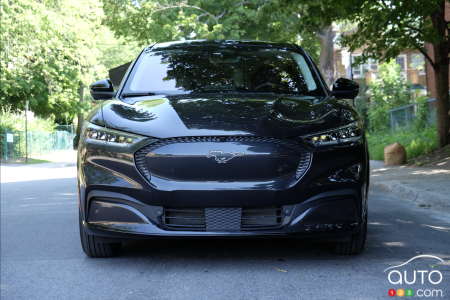Ford is recalling 34,762 units of the Mustang Mach-E electric crossover, due to a potential risk of the high-voltage battery’s main contactors overheating. In Canada the recall affects 4,707 Mustang Mach-E EVs, 2021-2022 model-years.
The affected models were manufactured between May 27, 2020, and May 24, 2022, and include both extended-range rear-wheel-drive and all-wheel-drive versions, as well as the GT versions. The regular-range model is not impacted by the campaign.
In the United States, the National Highway Traffic Safety Administration (NHTSA) issued a safety recall report indicating that fast direct-current charging and repeated accelerations can lead to overheating of the high-voltage battery main contactors. This could result in electrical issues and unexpected power loss, thereby increasing the risk of accidents.
In simple terms, fast charging or intensive accelerator usage may overheat the electrical switches in the battery system, causing damage that could affect the proper operation of the Mustang Mach-E, compromising its safety and performance.
Transport Canada's information regarding the recall is here.

Ford says the high-voltage battery junction box of the Mach-E will be replaced free of charge at dealerships. The automaker also noted there have been no reported accidents or injuries related to this defect.
Owners of affected vehicles will be notified of the recall between October 30 and November 10.
According to a battery technology-focused website, contactors are essential components of a high-voltage system. When closed, they allow electricity to flow from the battery to the motors. In an emergency, such as an accident, the main contactors open, interrupting the electrical connection between the high-voltage battery and the rest of the vehicle for safety reasons.
It's worth noting that this issue has persisted in the Mach-E since last year. In June 2022, Ford issued a recall following several reports of power loss due to a similar overheating issue. At that time, the company deployed multiple software updates to monitor the temperature and resistance of the contactors and reduce the battery and vehicle power to prevent damage.
The NHTSA's Office of Defects Investigation launched an investigation in August 2023 into how Ford handled the recall after owners complained of power loss, even after the software update.
This year, Ford has already issued 46 recalls, more than any other automaker, potentially affecting nearly five million vehicles in the United States, according to NHTSA data. Powertrain issues are the most common, accounting for 18 percent of all recalls, while electrical and backup prevention issues each represent 15 percent of recalls.

